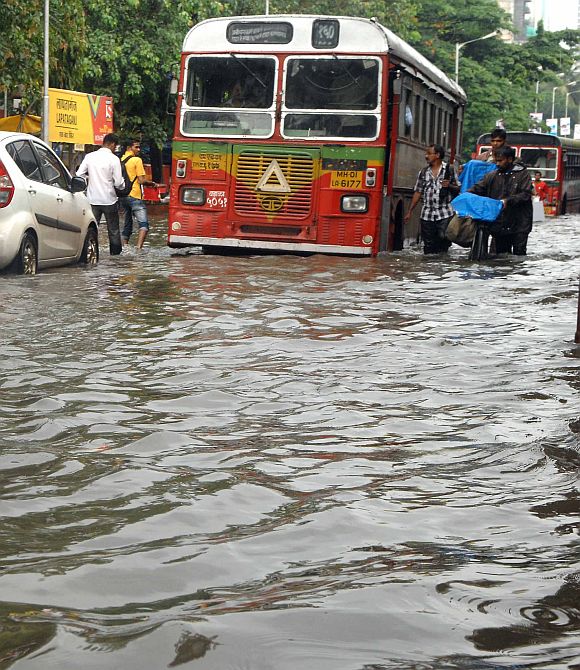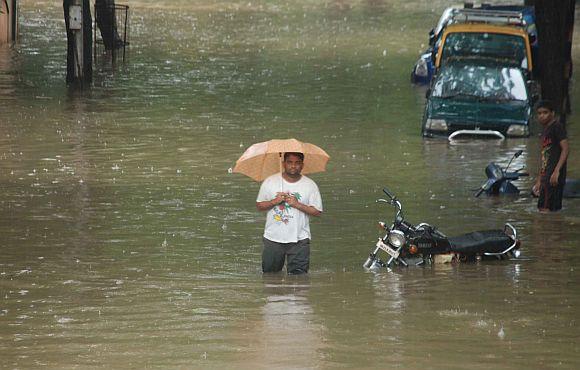 | « Back to article | Print this article |
Mumbai, no longer a citizen's city
Mahesh Vijapurkar laments the decay and decline of India's premier city.
The chaos that Mumbai experienced in the first three days of this monsoon speaks volumes about how the city is run, or put another way, not run the way it ought to be. When the grand headquarters of the city government was built, the civic body had taken pride in the city and itself, and put among the many figures, one representing the idea, Urbs prima in Indis. It meant the first city, or the best city of India.
That claim is perhaps to be seen in a different perspective now -- biggest city only by population congestion, biggest by virtue of trade and finance, the biggest host to the largest slum population, biggest list of unending problems unsolved, et al. But there it stops. For a city is not to be judged by the demographic dimensions and such like but also by how it conducts itself. The quality of life it provides to its citizens is the key and most of it has to come from the civic body.
The coat of arms of Municipal Corporation of Greater Mumbai proclaims has a motto, Yato Dharmastato Jaya, which when translated is “Where there is righteousness, there shall be victory”. Righteousness can come only when responsibilities are discharged and to the satisfaction of its citizens -- the biggest and primary stakeholders. That is where it is found lacking.
Click on NEXT to read further...
Mumbai, no longer a citizen's city
When it rained, the city virtually stood in its tracks because the care in ensuring the discharge of accumulating water at critical points was not taken. These happen to be the annual hotspots and well known to the civic body but no, the civic chief had to admit that as many as 50 pumps to deal with it had failed.
It appears, from media reports, that not only did the pumps fail but they did not have sufficient stock of fuel -- diesel, presumably -- and that the personnel mandated to deal with them did not know two elementary things: how to run the pumps and where to divert the water. Had the pumps functioned, they were anyhow doomed to fail.
One is glad that the top-most officer, Sitram Kunte was disarmingly frank and honest -- about how the disaster management system had not lived up to expectations and that it had several flaws even now. That it makes scarier for it was eight long years after the worst deluge and near death of Mumbai in 2005 is a matter of worry.
Municipal governance has failed on many counts, to start with, in even keeping the city clean, in educating the citizens in keeping it clean because the evolution of the city has been such that despite being stakeholders, the citizens have demanded rights that did not get but stayed away from their duties as well. That, however, should not let the city government off the hook.
Click on NEXT to read further...
Mumbai, no longer a citizen's city
Till now, the city which has nearly six out of ten of its residents living in slums and some more in slum-like formal housing, has never thought it prudent to include such a large chunk of its population in its planning, leave alone delivering on those plans. If the civic society, notably led by the Urban Design Research Institute, had not pressured, the need to map the slums would have been avoided in the new development plan under preparation.
Such an approach does lend itself to the criticism that the city has a class bias, which was pointed out by the city’s first municipal commissioner, Arthur Crawford who said it was run for the benefit of, and the designs of, the trade and commerce. Later urbanologists had even gone to the extent of describing the chawls, the forerunners of the slums, as warehouses of the most critical resource, human resource for the city’s industry, and no more.
Much has been said in the past and with justification by many Mumbai’s observers -- perhaps the most researched yet among all Indian cities -- that the city government lacks the basic sense of being a habitat for humans who apart from a pretence of a shelter, access to work, need other things that can at least enable them to breath. The open spaces have been under unrelenting assault, countenanced and sometimes in connivance of the civic body.
Click on NEXT to read further...
Mumbai, no longer a citizen's city
That approach of selectivity, of distinguishing citizen from another citizen, and the belief that in an intensely competitive Mumbai where the struggle is for survival as much as for getting ahead has atomised seems to be driving the callousness of the civic government. It is as if the unspoken credo seems to be -- and perhaps is -- “Let us get by somehow this year, and tomorrow is another day”.
That is possible only when a triad gets the stranglehold to the exclusion of the citizen: the politician who has no intention of giving anything to the city but taking as much as is possible by all cunning; the bureaucracy (bar a notable few Sitaram Kuntes) which only kowtows to the first for a share plus what it makes on the own; and the contractors who provide for the greed of the first two. It is as if there is a deliberate misgovernance for profiteering.
The pitiable condition of the roads, and the uncleared drains even after the monsoon, are the evidence of the cunning of the triad. The blockages in a drain left behind by a contractor and letting the area flood is a pointer to the collective mischief. A fine -- never had one seen such a prompt levy in recent times -- of Rs 1.5 crore on the guilty is a heartening departure from the slack associated with the civic body. The thing is, this tightening should continue, but would it?
As any citizen, he’d more likely to tell you he feels neglected. It is not his city.
Mahesh Vijapurkar is a commentator who takes the points of view of the common man seriously.
Top PHOTO features of the week
Click on MORE to see another set of PHOTO features...




